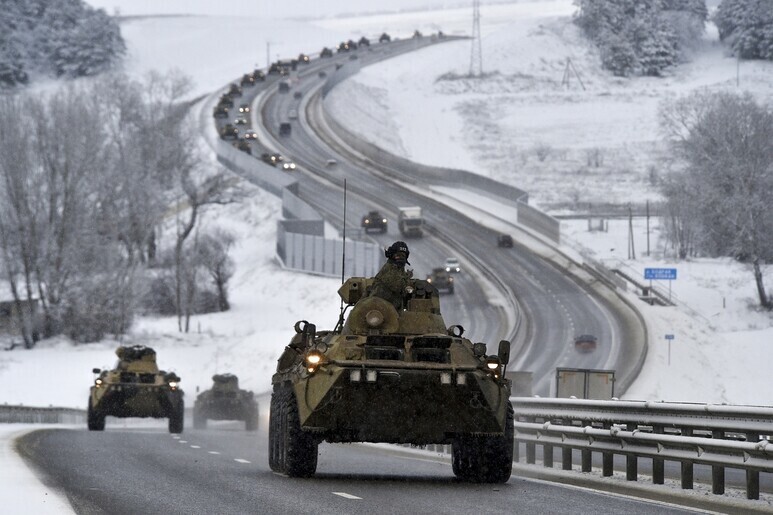hankyoreh
Links to other country sites 다른 나라 사이트 링크
[Column] US must reduce its number of fronts


Feeling a bit down last weekend, I pulled out the memoirs of Shigenori Togo (1882–1950). The descendant of a Korean potter who was taken to Japan during the Imjin Invasions, Togo — known also by his Korean name, Park Mu-deok — went down in history as the foreign minister in the Cabinet of Hideki Tojo, the figure who declared war against the US in December 1941.
Seeing the way the situation surrounding Ukraine seems to be spiraling toward catastrophe, some part of me must have been curious as to how Togo felt finding himself in a similar situation 80 years ago, unable to stop a war.
Like the Japanese empire he gave his allegiance to, Togo lived a life of contradictions. But perhaps the biggest contradiction in his life was the fact that he was foreign minister under opposing circumstances: when Japan declared war in the Pacific, and when it was defeated.
US-Japan relations began deteriorating rapidly after Japan’s aggressions escalated with the Second Sino-Japanese War in July 1937. Four years later, the conflict had reached the point of harsh sanctions, including an embargo on crude oil.
At around 11 pm on Oct. 17, 1941, Tojo made a call to Togo, asking him to serve as foreign minister. Togo replied that he had “no intention of agreeing to join the Cabinet until you mean that you are willing to make considerable concessions and truly cooperate so that negotiations [with the US] can proceed on a rational basis.”
Tojo said he would cooperate. But negotiations were not easy.
US Secretary of State Cordell Hull issued an ultimatum to Japan on Nov. 26 — what would later become known as the “Hull note.” The demands made in the document included Japan’s unconditional withdrawal from China, its agreement not to recognize any Chinese government besides the Kuomintang regime of Chiang Kai-shek, and its abandonment of the three-way alliance with Germany and Italy.
Seeing the US demands as calling on Japan to “utterly disregard the sacrifices we have made over such a long period and abandon our status as a major power in the Far East,” Togo abandoned negotiations. The attack on Pearl Harbor took place early in the morning on Dec. 18, shortly after this discouraging blow to the “last moderate.”
As a result, Japan was drawn into a reckless war that led to the deaths of 3.1 million Japanese, and even more people in neighboring countries.
Every time I read about the complexities of world history, I keenly sense how every country on the planet has its own unique circumstances, and how its people come to possess an internal “line” where they are unwilling to make any concessions.
Eighty years ago, that line for Japan was its status as a “major power in the Far East.” For contemporary China, it’s the “One China” principle that sees Taiwan as part and parcel of China. For Russia, it’s the unwillingness to allow NATO to expand as far as Ukraine, a country that used to be part of the Soviet Union.
Where does the US stand in comparison?
President Joe Biden is involved in some difficult confrontations on multiple fronts. In the beginning, he thought there were only two — Ukraine and the Taiwan Strait — but that turned out to be a big mistake.
Iran is desperately reaching out to China and Russia as it seeks to preserve its dignity by rescuing the Iran nuclear deal reached in July 2015. North Korea has been test-launching inexplicable missiles for days on end, while calling for a “withdrawal of hostile policies.”
Weakened by crisis at home and abroad, the US may have no chance of emerging victorious on all these different fronts.
Fortunately, there are calls emerging in the US for more rational considerations.
In a Jan. 13 contribution to the Los Angeles Times, former Secretary of Defense William Perry described Iran’s situation in 2021 as “eerily similar” to North Korea’s 20 years ago.
If the problem is left unaddressed, he and co-author Philip W. Yun warned, Iran will also be armed with nuclear weapons 20 years from now. They went on to note how “the perfect often becomes the enemy of the good,” which certainly is a saying worth repeating.
Michael Kimmage, a professor at the Catholic University of America, went even bolder. In a Jan. 17 Foreign Affairs piece titled “Time for NATO to Close Its Door,” he wrote, “With the alliance already overextended in one of the world’s most dangerous neighborhoods [i.e., near Russia], incorporating Ukraine would be strategic madness.”
What is the “line” that the US must preserve in the face of all these desperate parties? Perhaps it is seizing an advantageous position in the strategic race with China that will decide the fate of humankind going forward.
Achieving that will require a bold decision to reduce the number of fronts. To resolve these conflicts — with Russia, with Iran, and most of all with North Korea — it will need to be “willing to make considerable concessions and truly cooperate so that negotiations can proceed on a rational basis.”
Please direct questions or comments to [english@hani.co.kr]

Editorial・opinion
![[Column] Season 2 of special prosecutor probe may be coming to Korea soon [Column] Season 2 of special prosecutor probe may be coming to Korea soon](https://flexible.img.hani.co.kr/flexible/normal/500/300/imgdb/original/2024/0426/3317141030699447.jpg) [Column] Season 2 of special prosecutor probe may be coming to Korea soon
[Column] Season 2 of special prosecutor probe may be coming to Korea soon![[Column] Park Geun-hye déjà vu in Yoon Suk-yeol [Column] Park Geun-hye déjà vu in Yoon Suk-yeol](https://flexible.img.hani.co.kr/flexible/normal/500/300/imgdb/original/2024/0424/651713945113788.jpg) [Column] Park Geun-hye déjà vu in Yoon Suk-yeol
[Column] Park Geun-hye déjà vu in Yoon Suk-yeol- [Editorial] New weight of N. Korea’s nuclear threats makes dialogue all the more urgent
- [Guest essay] The real reason Korea’s new right wants to dub Rhee a founding father
- [Column] ‘Choson’: Is it time we start referring to N. Korea in its own terms?
- [Editorial] Japan’s rewriting of history with Korea has gone too far
- [Column] The president’s questionable capacity for dialogue
- [Column] Are chaebol firms just pizza pies for families to divvy up as they please?
- [Column] Has Korea, too, crossed the Rubicon on China?
- [Correspondent’s column] In Japan’s alliance with US, echoes of its past alliances with UK
Most viewed articles
- 1AI is catching up with humans at a ‘shocking’ rate
- 2After election rout, Yoon’s left with 3 choices for dealing with the opposition
- 3Is Japan about to snatch control of Line messenger from Korea’s Naver?
- 4No good, very bad game for Korea puts it out of Olympics for first time since 1988
- 51 in 5 unwed Korean women want child-free life, study shows
- 6Will NewJeans end up collateral damage in internal feud at K-pop juggernaut Hybe?
- 7Korea’s 1.3% growth in Q1 signals ‘textbook’ return to growth, says government
- 8Marriages nosedived 40% over last 10 years in Korea, a factor in low birth rate
- 9[Editorial] Japan’s rewriting of history with Korea has gone too far
- 10Why Korea shouldn’t welcome Japan’s newly beefed up defense cooperation with US